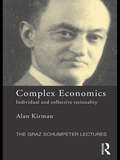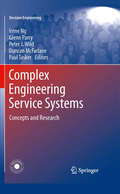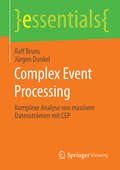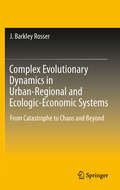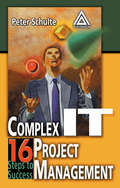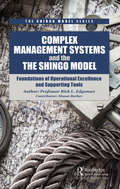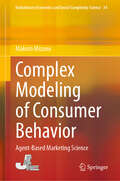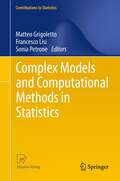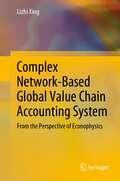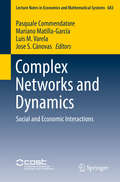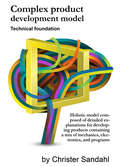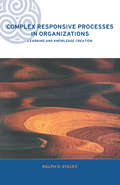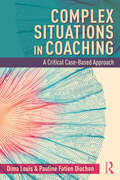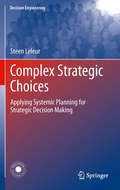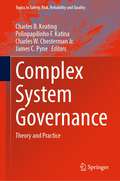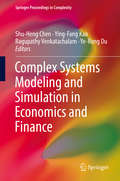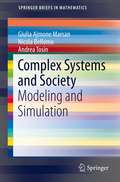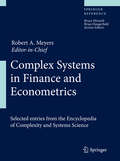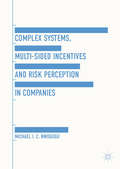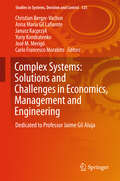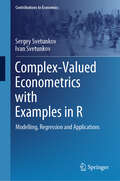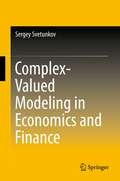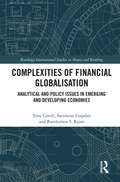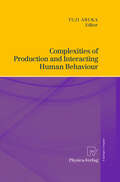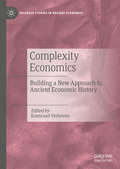- Table View
- List View
Complex Economics: Individual and Collective Rationality (The\graz Schumpeter Lectures #10)
by Alan KirmanThe economic crisis is also a crisis for economic theory. Most analyses of the evolution of the crisis invoke three themes, contagion, networks and trust, yet none of these play a major role in standard macroeconomic models. What is needed is a theory in which these aspects are central. The direct interaction between individuals, firms and banks does not simply produce imperfections in the functioning of the economy but is the very basis of the functioning of a modern economy. This book suggests a way of analysing the economy which takes this point of view. The economy should be considered as a complex adaptive system in which the agents constantly react to, influence and are influenced by, the other individuals in the economy. In such systems which are familiar from statistical physics and biology for example, the behaviour of the aggregate cannot be deduced from the behaviour of the average, or "representative" individual. Just as the organised activity of an ants’ nest cannot be understood from the behaviour of a "representative ant" so macroeconomic phenomena should not be assimilated to those associated with the "representative agent". This book provides examples where this can clearly be seen. The examples range from Schelling’s model of segregation, to contributions to public goods, the evolution of buyer seller relations in fish markets, to financial models based on the foraging behaviour of ants. The message of the book is that coordination rather than efficiency is the central problem in economics. How do the myriads of individual choices and decisions come to be coordinated? How does the economy or a market, "self organise" and how does this sometimes result in major upheavals, or to use the phrase from physics, "phase transitions"? The sort of system described in this book is not in equilibrium in the standard sense, it is constantly changing and moving from state to state and its very structure is always being modified. The economy is not a ship sailing on a well-defined trajectory which occasionally gets knocked off course. It is more like the slime described in the book "emergence", constantly reorganising itself so as to slide collectively in directions which are neither understood nor necessarily desired by its components.
Complex Engineering Service Systems: Concepts and Research (Decision Engineering)
by Peter Wild Irene Ng Glenn Parry Paul Tasker Duncan McfarlaneFor manufacturers of complex engineering equipment, the focus on service and achieving outcomes for customers is the key to growth. Yet, the capability to provide service for complex engineered products is less understood. Taking a trans-disciplinary approach, Complex Engineering Service Systems covers various aspects of service in complex engineering systems, with perspectives from engineering, management, design, operations research, strategy, marketing and operations management that are relevant to different disciplines, organisation functions, and geographic locations. The focus is on the many facets of complex engineering service systems around a core integrative framework of three value transformations - that of material/equipment, information and people. Complex Engineering Service Systems is the outcome of the EPSRC/BAE Systems S4T (Service Support Solutions: Strategy and Transition) research programme of 10 universities and 27 researchers, which examined how high-value manufacturers of complex engineering products adapt to a multi-partnered environment to design and deliver value in a service system. Complex Engineering Service Systems aims to be the main source of knowledge for academics and professionals in the research and practice of contracting, managing, designing, leading, and delivering complex engineering service systems. The book takes a value-based approach to integrating equipment and human factors into a total service provision. In doing so, it aims to advance the field of service systems and engineering.
Complex Event Processing: Komplexe Analyse von massiven Datenströmen mit CEP (essentials)
by Ralf Bruns Jürgen DunkelRalf Bruns und Jürgen Dunkel bieten eine kompakte Einführung in die Grundprinzipien von Complex Event Processing (CEP), das eine extrem leistungsfähige Softwaretechnologie zur systematischen Analyse von massiven Datenströmen in Echtzeit darstellt. Die Autoren stellen die wesentlichen Sprachkonzepte der Ereignisverarbeitung Schritt für Schritt vor. Eine Fallstudie aus dem M2M-Bereich verdeutlicht die praktische Anwendung von CEP. Moderne Unternehmen stehen vor der Herausforderung mit immer größeren Datenmengen umgehen zu müssen. Neben immensen statischen Datenbeständen ist es entscheidend, auch kontinuierlich eintreffende Datenströme effizient zu nutzen, um geschäftliche Entscheidungen situationsabhängig treffen zu können. Mit CEP ist es möglich, hochfrequente Datenströme intelligent zu analysieren und daraus zeitnah operative Unternehmensentscheidungen abzuleiten. CEP steht für eine neue Qualität von Unternehmensanwendungen - agil und effizient.
Complex Evolutionary Dynamics in Urban-Regional and Ecologic-Economic Systems: From Catastrophe to Chaos and Beyond
by J. Barkley RosserDrawing on the middle chapters from the first edition of J. Barkley Rosser's seminal work, From Catastrophe to Chaos, this book presents an unusual perspective on economics and economic analysis. Current economic theory largely depends upon assuming that the world is fundamentally continuous. However, an increasing amount of economic research has been done using approaches that allow for discontinuities such as catastrophe theory, chaos theory, synergetics, and fractal geometry. The spread of such approaches across a variety of disciplines of thought has constituted a virtual intellectual revolution in recent years. This book reviews the applications of these approaches in various subdisciplines of economics and draws upon past economic thinkers to develop an integrated view of economics as a whole from the perspective of inherent discontinuity.
Complex IT Project Management: 16 Steps to Success
by Peter SchulteProject Managers leading massive IT projects--defined as projects rolling out deliverables across geographic boundaries with budgets ranging well into the millions--need a unique level of expertise and an arsenal of personal and professional skills to successfully accomplish their tasks. Large IT initiatives inherently contain business conditions,
Complex Management Systems and the Shingo Model: Foundations of Operational Excellence and Supporting Tools (The Shingo Model Series)
by Rick EdgemanThe Shingo Enterprise Excellence Prize Model (SEEM) has exerted global influence over the ways that exceptional organizations formulate/deploy strategy with its focus on processes, Lean thinking, continuous improvement, innovation, workforce development, and supplier strategies. This book details the SEEM, which lies at the heart of the Shingo Prize. It will link the theoretical underpinnings of the SEEM and their implications for practice. Case studies illustrate important points. Selected tools that support practical implementation of the model are discussed and their use illustrated. This book will deepen understanding of why the model works and how implementation can be accomplished.
Complex Modeling of Consumer Behavior: Agent-Based Marketing Science (Evolutionary Economics and Social Complexity Science #34)
by Makoto MizunoThis book reports what progress is being and should be made in marketing science by social complexity science through such means as agent-based modeling and complex networks, which is seldom addressed by books reviewing the state of the art of marketing research or marketing science. Recently, as the penetration of brand-new communication technologies such as social media or mobile phones is connecting consumers more tightly than ever, marketers should understand and harness complex social interactions between consumers as well as between consumers and firms. Traditional marketing science does not sufficiently capture such phenomena; hence, the emerging alternative approaches are reflecting advances in social complexity science. The aim of this book is to give an overview of these newly emerging research trends, focusing mainly on the following three topics: diffusion of new products, choice and relationship with existing brands and marketing communication including consumers’ word-of-mouth. These topics have attracted a lot of attention among marketers in particular in rapidly growing markets such as hi-tech or services, where consumers’ mutual interaction and their bounded-rational behavior play critical roles. The prospective readers of this book include researchers, graduate students and practitioners with high expertise (e.g. data scientists) in both marketing/consumer research areas and complexity science areas such as computer science, physics and mathematical social science. The book serves as a bridge by providing the evolving knowledge on social complexity modeling for marketing researchers and the accumulated knowledge on marketing/consumer research for complexity researchers. In addition to reviewing previous and ongoing studies, this book offers the agenda for future researchers to discuss what problems have not been solved yet and need social complexity science approaches.
Complex Models and Computational Methods in Statistics (Contributions to Statistics)
by Sonia Petrone Francesco Lisi Matteo GrigolettoThe use of computational methods in statistics to face complex problems and highly dimensional data, as well as the widespread availability of computer technology, is no news. The range of applications, instead, is unprecedented. As often occurs, new and complex data types require new strategies, demanding for the development of novel statistical methods and suggesting stimulating mathematical problems. This book is addressed to researchers working at the forefront of the statistical analysis of complex systems and using computationally intensive statistical methods.
Complex Network-Based Global Value Chain Accounting System: From the Perspective of Econophysics
by Lizhi XingThis book aims to theoretically and empirically enrich the GVC accounting framework with statistical physics and complex network theory from the perspective of econophysics, thus adding up to the existing theories. Besides, it also aims at capturing the essences of network models such as topological complexity, hierarchy, transmissibility, interaction, and causality and reflecting the objective interrelations among economies or between economies and economic systems on the GVC, so as to reveal the inherent evolution of the cross-regional and even global economic systems.
Complex Networks and Dynamics: Social and Economic Interactions (Lecture Notes in Economics and Mathematical Systems #683)
by Pasquale Commendatore Mariano Matilla-García Luis M. Varela Jose S. CánovasThis volume sheds light on the current state of complex networks and nonlinear dynamics applied to the understanding of economic and social phenomena ranging from geographical economics to macroeconomics and finance, and its purpose is to give readers an overview of several interesting topics for research at an intermediate level. Three different and interdisciplinary, but complementary, aspects of networks are put together in a single piece, namely: (i) complex networks theory, (ii) applied network analysis to social and economic interrelations, and (iii) dynamical evolution of systems and networks. The volume includes contributions from excellent scholars in economics and social sciences as well as leading experts in the fields of complex networks and nonlinear dynamics.
Complex Product Development Model: Holistic model composed of detailed explanations for developing products containing a mix of mechanics, electronics, and programs
by Christer SandahlHave you ever tried to explain what quality is? Let's say you know perfectly well how to develop a quality product, but your arguments are undermined all the time by fragmented details. Time and again you have to step back to sort out the details, in order to make a renewed attack. But somewhere along the debate you get stuck. The details never get sorted out. There are too many of them, and you don't share their definitions. After an hour or two you give up, and you revert to the old way of working, although you know you could do so much better. Now there is a solution to your frustration. The complex product development model explains all details and puts them together into a holistic and consistent lodestar for all engineers, managers, and teachers dealing with development of products containing a mix of mechanics, electronics, and programs. This model is an update of best practices from the most applicable development models in the world, scrutinized through a lifetime of product development experience in local, regional, and international product development companies. This book explains Cpdm principles in-depth, with numerous real examples. Difficulties and complexities are illustrated by a wealth of drawings, figures, and tables. You can go back and forth to understand every aspect. Over a product's life cycle, development cost is seldom significant. Development time is sometimes important, but most often the crucial shortage lies in quality, capability, and predictability. The Cpdm toolbox is available—use it to win your debates and start to improve this industry forever.
Complex Responsive Processes in Organizations: Learning and Knowledge Creation (Complexity and Emergence in Organizations)
by Ralph StaceyThe past decade has seen increasing focus on the importance of information and knowledge in economic and social processes, the so-called 'knowledge economy'. This is reflected in the popularity amongst practicing managers and organizational theorists of notions of learning, sense-making, knowledge creation, knowledge management and intellectual capital in organizations and more recently, of emotional intelligence as an important management skill. This insightful book: argues that the information processing view of knowledge creation held by systems thinkers is no longer tenable develops the alternative perspective of Complex Responsive Processes of relating, drawing on the complexity sciences as a source for analogies with human action places self-organizing interaction at the centre of the knowledge creating process in organizations. Learning and knowledge creation are seen as qualitative processes of power relating that are emotional as well as intellectual, creative as well as destructive, enabling as well as constraining, and the result is a radical questioning of the belief that organizational knowledge is essentially codified and centralized. Instead, organizational knowledge is understood to be in the relationships between people in an organization and has to do with the qualities of those relationships.
Complex Situations in Coaching: A Critical Case-Based Approach
by Dima Louis Pauline Fatien DiochonComplex Situations in Coaching is a collection of 20 typical yet underdiscussed issues in coaching, ranging from value conflicts, multiple agendas, power dynamics, and emotion management, to the role of money, etc. Organized into ten chapters, they are positioned into the literature and commented on by world-class coaches, coaching researchers, educators, and program directors. This plurality of voices is designed to foster dialogue, questions, and solutions; this setting, supportive of reflexivity, critical thinking, and diversity awareness, is essential to the development and education of coaches in an increasingly complex world where ready-made solutions prove limited. Thus, beyond a 'toolkit approach', this book engages in a thought-provoking and multi-perspective journey in support of the professionalization and continuous education of coaches, instructors, and/or supervisors.
Complex Strategic Choices: Applying Systemic Planning for Strategic Decision Making (Decision Engineering)
by Steen LeleurEffective decision making requires a clear methodology, particularly in complex, globally relevant situations. Institutions and companies in all disciplines and sectors are faced with increasingly multi-faceted areas of uncertainty which cannot always be effectively handled by traditional strategies. Complex Strategic Choices provides clear principles and methods which can guide and support strategic decision to face modern challenges. By considering ways in which planning practices can be renewed and exploring the possibilities for acquiring awareness and tools to add value to strategic decision making, Complex Strategic Choices presents a methodology which is further illustrated by a number of case studies and example applications. Dr. Techn. Steen Leleur has adapted previously established research based on feedback and input from various conferences, journals and students resulting in new material stemming from and focusing on practical application of systemic planning. The outcome is a coherent and flexible approach named systemic planning. The inclusion of both the theoretical and practical aspects of systemic planning makes this book a key resource for researchers and students in the field of planning and decision analysis as well as practitioners dealing with strategic analysis and decision making. More broadly, Complex Strategic Choices acts as guide for professionals and students involved in complex planning tasks across several fields such as business and engineering.
Complex System Governance: Theory and Practice (Topics in Safety, Risk, Reliability and Quality #40)
by Polinpapilinho F. Katina Charles B. Keating Charles W. Chesterman Jr. James C. PyneThis book explores Complex System Governance (CSG)—an emerging field concerned with the design, execution, and evolution of essential functions necessary to ensure continued viability of a system. The book focuses on three primary development areas to better understand and utilize current developments CSG. First, the conceptual foundations for CSG are developed, from systems theory, management cybernetics, and governance. Second, a set of critical CSG topics are examined from conceptual as well as practice perspectives. Third, several development and application issues are discussed. Ultimately, CSG is positioned as an emerging field with strong theoretical grounding and significant implications for improving practices and performance to better address complex systems and their problems.
Complex Systems Modeling and Simulation in Economics and Finance (Springer Proceedings in Complexity)
by Shu-Heng Chen Ying-Fang Kao Ragupathy Venkatachalam Ye-Rong DuThis title brings together frontier research on complex economic systems, heterogeneous interacting agents, bounded rationality, and nonlinear dynamics in economics. The book contains the proceedings of the CEF2015 (21st Computing in Economics in Finance), held 20-22 June 2015 in Taipei, Taiwan, and addresses some of the important driving forces for various emergent properties in economies, when viewed as complex systems. The breakthroughs reported in this book are a result of an interdisciplinary approach and simulation remains the unifying theme for these papers as they deal with a wide range of topics in economics. The text is a valuable addition to the efforts in promoting the complex systems view in economic science. The computational experiments reported in the book are both transparent and replicable.Complex System Modeling and Simulation in Economics and Finance is useful for graduate courses of complex systems, with particular focus on economics and finance. At the same time it serves as a good overview for researchers who are interested in the topic.
Complex Systems and Society: Modeling and Simulation (SpringerBriefs in Mathematics)
by Giulia Ajmone Marsan Nicola Bellomo Andrea TosinThis work aims to foster the interdisciplinary dialogue between mathematicians and socio-economic scientists. Interaction among scholars and practitioners traditionally coming from different research areas is necessary more than ever in order to better understand many real-world problems we face today. On the one hand, mathematicians need economists and social scientists to better address the methodologies they design in a more realistic way; on the other hand, economists and social scientists need to be aware of sound mathematical modelling tools in order to understand and, ultimately, solve the complex problems they encounter in their research. With this goal in mind, this work is designed to take into account a multidisciplinary approach that will encourage the transfer of knowledge, ideas, and methodology from one discipline to the other. In particular, the work has three main themes: Demystifying and unravelling complex systems; Introducing models of individual behaviours in the social and economic sciences; Modelling socio-economic sciences as complex living systems. Specific tools examined in the work include a recently developed modelling approach using stochastic game theory within the framework of statistical mechanics and progressing up to modeling Darwinian evolution. Special attention is also devoted to social network theory as a fundamental instrument for the understanding of socio-economic systems.
Complex Systems in Finance and Econometrics
by Robert A. MeyersComplex Systems in Finance and Econometrics is an authoritative reference to the basic tools and concepts of complexity and systems theory as applied to an understanding of complex, financial-based business and social systems. Fractals, nonlinear time series modeling, cellular automata, game theory, network theory and statistical physics are among the essential tools and techniques for predicting, monitoring, evaluating, managing, and decision-making in a wide range of fields from health care, poverty alleviation, and energy and the environment, to manufacturing and quality assurance, model building, organizational learning. and macro and microeconomics. Sixty of the world's leading experts present 47 articles for an audience of advanced undergraduate and graduate students, professors, and professionals in all of these fields.
Complex Systems, Multi-Sided Incentives and Risk Perception in Companies
by Michael I.C. NwoguguMost research about financial stability and sustainable growth focuses on the financial sector and macroeconomics and neglects the real sector, microeconomics and psychology issues. Real-sector and financial-sectors linkages are increasing and are a foundation of economic/social/environmental/urban sustainability, given financial crises, noise, internet, “transition economics”, disintermediation, demographics and inequality around the world. Within complex systems theory framework, this book analyses some multi-sided mechanisms and risk-perception that can have symbiotic relationships with financial stability, systemic risk and/or sustainable growth. Within the context of Regret Minimization, MN-Transferable Utility and WTAL, new theories-of-the-firm are developed that consider sustainable growth, price stability, globalization, financial stability and birth-to-death evolutions of firms. This book introduces new behaviour theories pertaining to real estate and intangibles, which can affect the evolutions of risk-taking and risk perception within organizations and investment entities. The chapters address elements of the dilemma of often divergent risk perceptions of, and risk-taking by corporate executives, regulators and investment managers.
Complex Systems: Solutions and Challenges in Economics, Management and Engineering
by Janusz Kacprzyk Yuriy Kondratenko Christian Berger-Vachon Anna María Gil Lafuente José M. Merigó Carlo Francesco MorabitoThis book presents an authoritative collection of contributions reporting on fuzzy logic and decision theory, together with applications and case studies in economics and management science. Dedicated to Professor Jaume Gil Aluja in recognition of his pioneering work, the book reports on theories, methods and new challenges, thus offering not only a timely reference guide but also a source of new ideas and inspirations for graduate students and researchers alike.
Complex-Valued Econometrics with Examples in R: Modelling, Regression and Applications (Contributions to Economics)
by Sergey Svetunkov Ivan SvetunkovThis book explores the application of complex variables to econometric modeling. Providing a thorough introduction to the theory of complex numbers, it extends these concepts to develop complex-valued models that enhance the accuracy and depth of economic forecasting and data analysis. From simple to multiple complex linear regression, the monograph discusses model formulation, estimation techniques, and correlation analysis, supported by examples in R. This comprehensive guide is a useful resource for students, researchers, and practitioners aiming to apply advanced mathematical techniques to tackle complex real-life problems, making it a useful tool for enhancing predictive analytics in business, economics, and finance.
Complex-Valued Modeling in Economics and Finance
by Sergey SvetunkovComplex-Valued Modeling in Economics and Finance outlines the theory, methodology, and techniques behind modeling economic processes using complex variables theory. The theory of complex variables functions is widely used in many scientific fields, since work with complex variables can appropriately describe different complex real-life processes. Many economic indicators and factors reflecting the properties of the same object can be represented in the form of complex variables. By describing the relationship between various indicators using the functions of these variables, new economic and financial models can be created which are often more accurate than the models of real variables. This book pays critical attention to complex variables production in stock market modeling, modeling illegal economy, time series forecasting, complex auto-aggressive models, and economic dynamics modeling. Very little has been published on this topic and its applications within the fields of economics and finance, and this volume appeals to graduate-level students studying economics, academic researchers in economics and finance, and economists.
Complexities of Financial Globalisation: Analytical and Policy Issues in Emerging and Developing Economies (Routledge International Studies in Money and Banking)
by Ramkishen S. Rajan Sasidaran Gopalan Tony CavoliSince the 1990s, several emerging market and developing economies (EMDEs) have, to varying degrees, embraced the process of financial globalisation, broadly defined as a set of policies that involve allowing for greater openness to cross-border capital flows as well as greater market access to foreign financial institutions. This book provides a systematic empirical analysis on the complex interactions between financial sector development, macroeconomic and financial stability in EMDEs in general and those in the Asian region in particular. The book consists of three sections pertaining to monetary and exchange rate policies under financial globalisation; financial inclusion and macroeconomic policies in the context of financial liberalisation; and finally, the dynamics of foreign direct investment flows and their real impacts in EMDEs. Each of the chapters analyse important economic policy issues of contemporary relevance and is informed by data and rigorous empirical analysis. The book will be appealing to anyone interested in exploring the implications of a key set of issues emanating from financial globalisation on EMDEs in a rigorous but readable manner.
Complexities of Production and Interacting Human Behaviour
by Yuji ArukaAs the real world is rapidly becoming more and more complicated, economists need to venture beyond the boundaries of mainstream economics and integrate philosophical thought and complexity into their analytical frameworks. In this context, this volume brings together papers on economic theory and its related issues, exploring complex production systems and heterogeneously interacting human behavior. The author challenges economists to integrate economic theory and moral science anew by referring to evolutionary economics and socio-econophysics. The three parts of the book focus on the complexities of production and social interaction, the moral science of heterogeneous economic interaction, and the Avatamsaka's dilemma of the two-person game with only positive spillovers.
Complexity Economics: Building a New Approach to Ancient Economic History (Palgrave Studies in Ancient Economies)
by Koenraad VerbovenEconomic archaeology and ancient economic history have boomed the past decades. The former thanks to greatly enhanced techniques to identify, collect, and interpret material remains as proxies for economic interactions and performance; the latter by embracing the frameworks of new institutional economics. Both disciplines, however, still have great difficulty talking with each other. There is no reliable method to convert ancient proxy-data into the economic indicators used in economic history. In turn, the shared cultural belief-systems underlying institutions and the symbolic ways in which these are reproduced remain invisible in the material record. This book explores ways to bring both disciplines closer together by building a theoretical and methodological framework to evaluate and integrate archaeological proxy-data in economic history research. Rather than the linear interpretations offered by neoclassical or neomalthusian models, we argue that complexity economics, based on system theory, offers a promising way forward.
